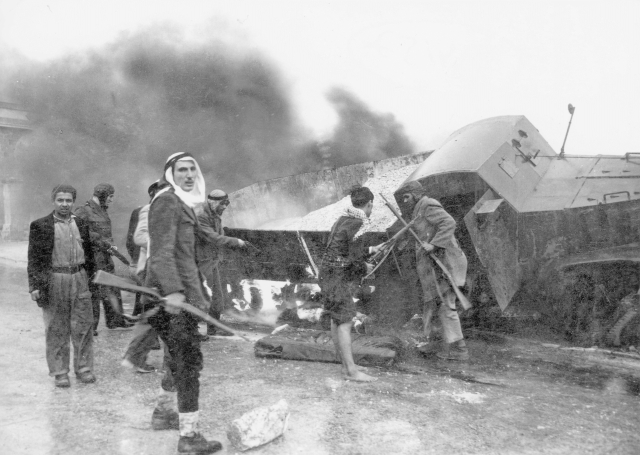On January 16th, 1948, just a few months before Israel declared independence, a convoy of 35 Palmach troops delivering supplies to Jews in the Gush Etzion area of Judea, southeast of Jerusalem, were ambushed, slaughtered, and their bodies mutilated by Arab villagers nearby.
The Palmach and Haganah members set out on foot from Jerusalem to Gush Etzion, under the command of Danny Mas. The troops were on their way to deliver weapons, ammunition, medical equipment, batteries and explosives to the besieged Gush Etzion Jewish village which was subject to an Arab blockade. As a result of the Arab squeeze on the Jerusalem to Gush Etzion road, it was decided that the supply chain would go to Gush Etzion on foot.
Monument to the 'Convoy of 35' desecrated: New monument to convoy of Palmach fighters who were killed while attempting to reinforce Gush Etzion during War of Independence vandalized. https://t.co/O5EkgLoAgZ ArutzSheva pic.twitter.com/FY8SWY58jG
— Jewish Community (@JComm_NewsFeeds) May 5, 2020
The men decided to take a different route which was familiar to the Palmach patrols from previous trips to Gush Etzion. The group organized itself for the mission in the Har Tov settlement, which it arrived at by traveling from Jerusalem. After camping overnight in the middle of the hostile Arab village, the troops were discovered by two Arab women and shepherds from the Arab village of Mechimi Qom.
They only had to go a short distance to get out of the danger zone, but their path was blocked by the Arab villagers. A fierce battle broke out between the platoon and the crowds of Arabs who surrounded them. After managing to escape the first ambush, they were discovered yet again. Completely outnumbered and with little ammunition left, the Zionist militants fought till the very last man, who according to Arab accounts, fought with the stones he gathered from the ground.
35 Palmach victims buried in Kf Etzion; relatives came from J'lem in armored buses w/ police, army escort [19 Jan 48] pic.twitter.com/Qd05o5wb
— 48 Arab Israeli War (@1948War) January 19, 2015
The Arab mob looted the soldiers of any valuables and then mutilated their bodies. Two days after the battle, a British police inspector who chose not to intervene in the horrific battle or punish the Arabs who had committed the atrocities brought the victims to Kfar Etzion where they were buried with a full military ceremony.
a division of 35 fighters from the Palmach who left #Jerusalem on January 15, 1948 to assist the Etzion besieged bloc. The group was killed by Arab terrorists.
— Israel Kicks A** (@Israelkicksass) February 2, 2022
2/2 pic.twitter.com/EO7uvRTApV
Among the fallen were some of the best commanders and soldiers in the Palmach at the time. After the War of Independence, their coffins were moved, along with the rest of the fighters who fell in the Gush Etzion battles, for burial in the military cemetery on Mount Herzl in Jerusalem. The state of the badly mutilated bodies when found was so horrific, it became an extremely difficult process just to identify the different soldiers killed.
In memory of them, the poet Haim Guri, also a Palmach veteran who served in the Jerusalem district, wrote his most famous poem that would become an unofficial anthem for Israel’s independence, “Heneh Motalot Gofateinu” ( “Here lie our bodies”).


